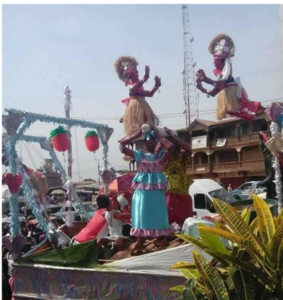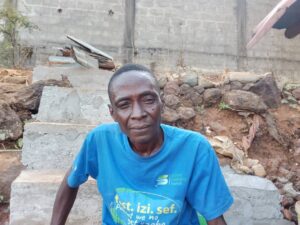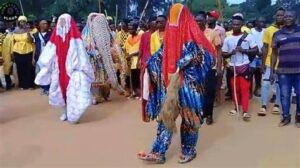By sia.ngevao@awokonewspaper.sl
Freetown, SIERRA LEONE – Sierra Leone, a country with a deep cultural heritage, has long celebrated traditions that unite its people and reflect its history. Among these are two beloved events: the mask devil dance and the lantern parades, both rooted in Sierra Leone’s creativity and sense of identity. However, in recent years, these once-peaceful celebrations have become entangled in political agendas, leading to violence and division. As a result, the government has imposed a ban on both, raising questions about the balance between preserving cultural traditions and maintaining public safety.
The Mask Devil Dance: A Ritual of Spiritual and Social Identity
The mask devil dance is an age-old ritual tied to Sierra Leone’s secret societies, particularly the Poro, Wonde, and Gbangbani. These societies play a significant role in Sierra Leonean life, influencing social norms, political power, and religious rites. The dance, featuring performers cloaked in intricate masks, is a powerful symbol of ancestral connection, spirituality, and social order. Historically, it has marked important events such as religious holidays, rites of passage, and political milestones.
For centuries, the mask devil dance was a symbol of unity and pride, but in recent years, it has become a flashpoint for conflict. Political factions began using the dance as a tool to rally support, leading to violent confrontations between rival groups. What was once a spiritual expression became a battleground for political influence, transforming the dance into a symbol of division rather than unity.
Ojeh performance in Freetown The Lantern Parade: A Beacon of Cultural Pride
Similarly, the lantern parade, introduced in the 1930s, was once a joyful event that brought communities together to celebrate Sierra Leonean creativity and independence. Featuring colourful lanterns crafted by local artisans, the parade illuminated the streets of Freetown with messages of unity and hope. But like the mask devil dance, the lantern parade also fell victim to political manipulation. Political slogans began appearing on the lanterns, turning the event into a platform for partisan propaganda.
As tensions escalated, the peaceful atmosphere of the parade was shattered. Violence broke out, property was destroyed, and lives were lost. The government, faced with the growing unrest, imposed a ban on the lantern parade, leaving many to mourn the loss of a cherished tradition.

The Government’s Response: Safety vs. Cultural Heritage
The Sierra Leonean government, in its efforts to curb violence, justified the ban on both the mask devil dance and the lantern parade as necessary for public safety. The Ministry of Tourism and Cultural Affairs acknowledged the cultural significance of these events but emphasized that ensuring public order takes priority. While some citizens support the ban, viewing it as a necessary step to prevent further conflict, others see it as a profound loss of identity.
The Impact on Cultural Identity and Legacy
For many Sierra Leoneans, the ban represents more than a temporary measure—it symbolizes the erosion of a cultural legacy passed down through generations. The mask devil dance and lantern parade were more than artistic expressions; they were a reflection of Sierra Leone’s resilience, creativity, and sense of community. Their absence leaves a void, particularly for artisans like Mohamed Karim Bendu, who dedicated his life to crafting lanterns that told stories of Sierra Leone’s history.
Bendu, like many others, mourns the loss of his craft, wondering if the light of Sierra Leone’s cultural spirit will ever shine as brightly again. For those who participated in or attended these events, the ban feels like a break from tradition, an interruption in the cultural continuity that has defined their lives.
Mohamed Karim Bendu

Voices of Opposition: Advocating for a Return to Tradition
While the government remains firm in its stance, many cultural advocates argue that the ban is not the solution. Figures like Ahmed Tejan Cole, of the Heritage Foundation, and Sahr Martin Kabba, founder of the art collective ‘Train to Sierra Leone,’ have called for a more balanced approach. They propose regulated performances, community education, and increased security measures to ensure that these traditions can be revived without the threat of violence.
Cole believes that the answer lies in restoring the cultural significance of these events, stripping away the political interference that has corrupted them. By introducing permits, limiting political messaging, and involving law enforcement, Sierra Leone can preserve its cultural heritage while ensuring public safety. Kabba emphasizes the economic and social potential of reviving the lantern parade, noting that it could boost tourism, create jobs, and foster unity among diverse communities.
A Path Forward: Reclaiming Cultural Traditions
The question now facing Sierra Leone is whether the nation can reclaim its cultural traditions while ensuring they are not exploited for political purposes. The government, communities, and cultural leaders must work together to find a way to revive these traditions in a safe, responsible manner. By doing so, Sierra Leone can preserve its rich cultural identity while addressing the legitimate concerns of public safety.
The media also plays a crucial role in raising awareness about the importance of cultural preservation. By highlighting the socio-economic impacts of the ban and amplifying the voices of those advocating for restoration, the public can remain engaged in this critical conversation.
Conclusion: The Future of Sierra Leone’s Cultural Heritage
The fate of Sierra Leone’s mask devil dance and lantern parade remains uncertain, but their importance to the nation’s identity is undeniable. Whether these cherished traditions will be restored or relegated to history depends on the collective efforts of policymakers, cultural advocates, and communities. The challenge is clear: to strike a balance between preserving cultural heritage and ensuring peace and security. How Sierra Leone navigates this path will shape its cultural landscape for generations to come. PSN/1/1/2025


